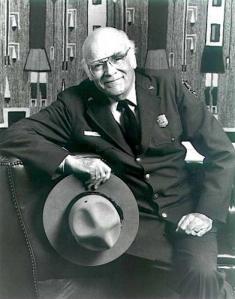When you think of the life of Roger Kennedy, the former director of the National Park Service who passed away at the age of 85 last week, you think almost immediately of the old adage that “they don’t make ‘em like they used to.”
Kennedy defined the idea of a Renaissance man, a concept which today merely means multi-tasking, which is not the same thing.
Kennedy lived a life of service and only became the NPS director relatively late in his life when President Bill Clinton appointed him to the position in 1993. By that time, he had already become a noted attorney, historian, television news correspondent, radio journalist and author of 12 books on American history, architectural history and public affairs. His last book, in fact, was published in 2009, a work called “When Art Worked: The New Deal and Democracy.”
He had served the nation and six presidents in various capacities, including Special Assistant to the U.S. Attorney General, the U.S. Secretary of Health, and Welfare and the U.S. Secretary of Labor.
The current NPS director, Jonathan B. Jarvis said that “Roger made it possible for everyone to have a stake in the national parks.”
Eight parks were added to the national park system during his tenure and you can tell the eclectic nature of his interests and passions from the list, among them the Tall grass Prairie National Preserve in Kansas, the New Bedford Whaling National Historical Park in Massachusetts, the Cane River Creole National Historical Park and the New Orleans Jazz National Historical Park.
During his tenure, he implemented a major restructuring of the Service while defending the Park Service against changes that would have undermined the system’s mission. He insisted that the park system tell multiple and diverse sides of the American historical story, a stance that often came under fire. He was a futurist in the sense that he anticipated the emergence of the Internet as a major communication tool to tell the American historical story to a huge audience.
He resisted government cutbacks that would weaken the ability to tell an inclusive story of the history of America. In 2002, he warned that “The impulse to prune back the budgets and get rid of the newer parks was all code for ‘let’s stop paying attention to blacks, Hispanics, women.’”
Kennedy could always be seen during the time of his tenure wearing the familiar uniform of the NPS, something that critics saw as grandstanding, but something he did with a great deal of pride.
Look at his life and writings; he had a lot to be proud of.


